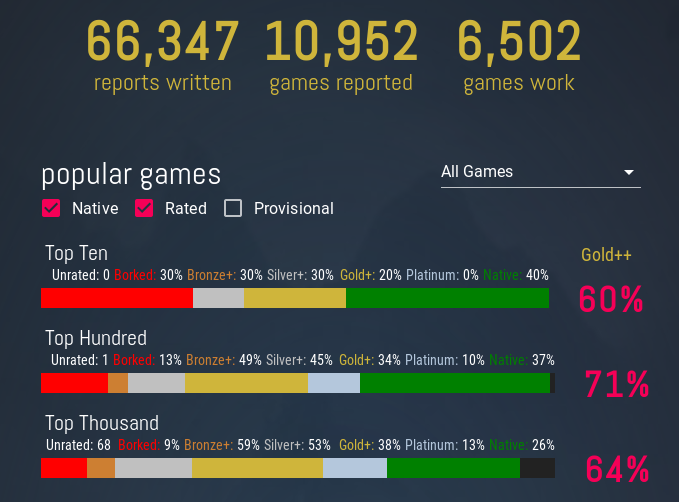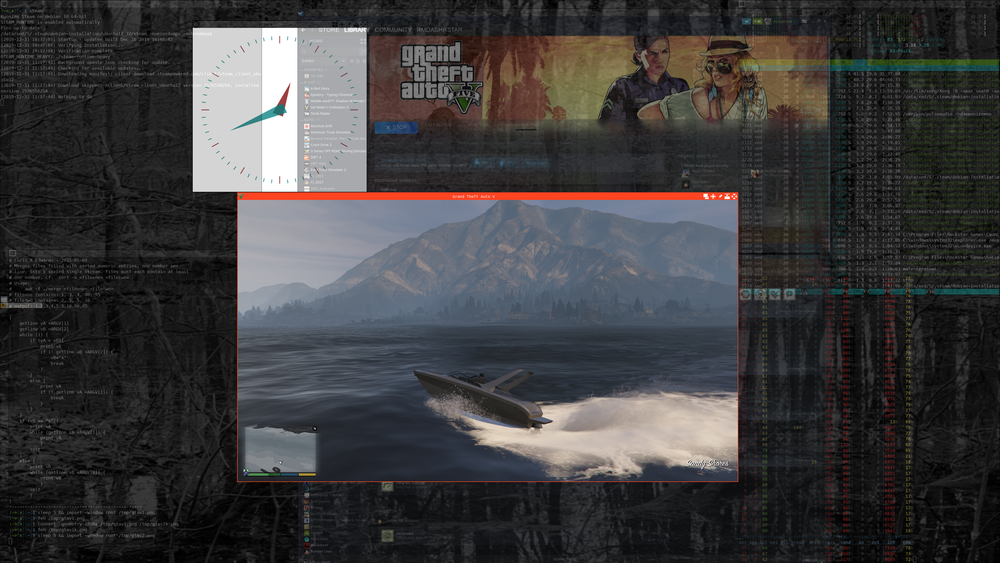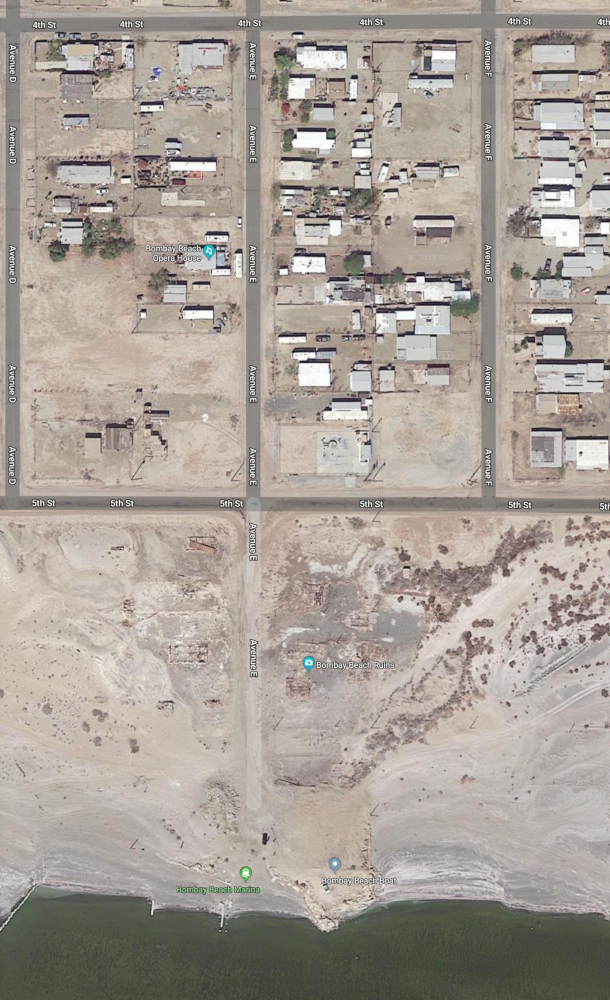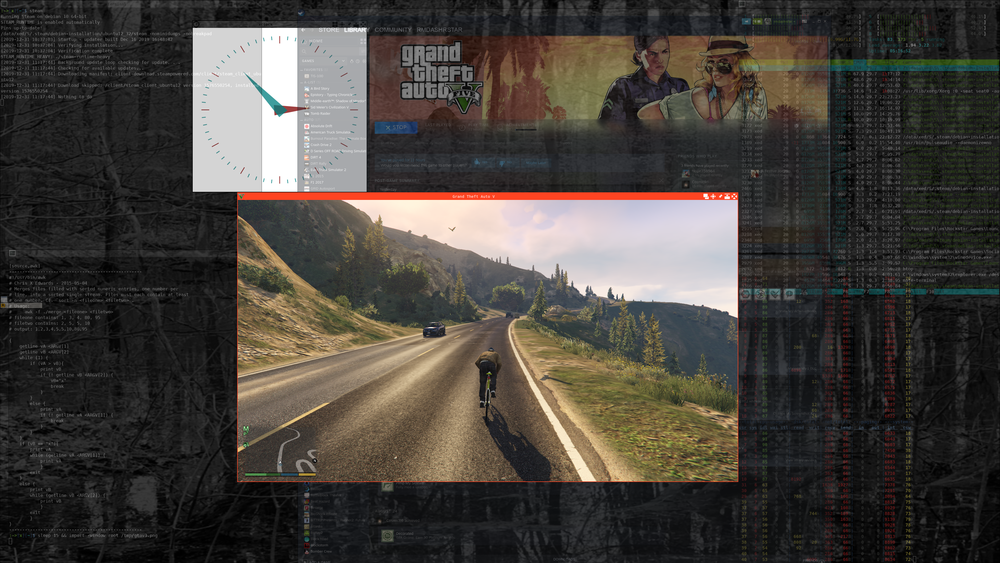It’s been a very tough December for me. After a lifetime of avoiding serious illness, I’ve spent the past four weeks fighting either pneumonia or something functionally identical. I had planned to write about some interesting and intelligent stuff, but with my brain half gone we’ll have to lower expectations.
The holidays are a time when people like me are desperate to avoid going to places other people go to. It’s a good time to get caught up on sitting in front of a computer for dozens of hours at a time. With half my brain out of action, it’s specifically a good time to get caught up with my video game agenda.
To quickly review, I’m a serious video game enthusiast who has traditionally not played video games. This is because I’ve also traditionally been even more of an enthusiast for stubbornly not using terrible operating systems. But times are changing!
In 1993 the Wine Project was started. Yes, pretty much as soon as Microsoft Windows came out there were people who despised it enough to want to put it out of business. First we need a quick technical digression.
Your operating system manages resources and blah blah blah. I’ve argued for decades now that normal people don’t know what their operating system does and they emphatically do not care. So why the fuss? Well, the real consequence of not using Big Brother’s ubiquitous OS, is that, thanks to network effects, you will not be able to run any cool software.
Why is this? The cool software you run in Windows is compiled for the chip inside your computer. Why exactly do you specifically need Windows on hand to run the compiled code? The answer is that software which is expecting Windows makes system calls. An easy example is reading some data from a file. You have some cool software and it must get some data off the disk. In its executable, it makes a system call asking the program that manages system resources (the OS, remember?), to go find, verify, open, and read that data, hopefully without screwing it up.
The Wine Project was a stupendously ambitious initiative to enumerate all of the things Windows is ever asked to do, and to instead handle those requests using the Linux way of doing things. When I first encountered the project 20 years ago, basically nothing worked. They were targeting things like Windows' Solitaire with unstable results. But these guys are stubborn, not stupid. Twenty years of dogged grinding has actually worked! Today, there are very few things that a program designed for Windows can ask of the operating system that Linux and Wine can’t intercept and handle natively, often with better performance.
Years ago, Wine could already handle pretty much any typical banal enterprise software. In the last few years, Wine has aimed even higher striving to support the most complex and sophisticated software in existence: games.
A couple of years ago, I wrote about the strange but welcome push by Valve to aggressively promote games that ran natively on Linux. Despite a vanishingly small percentage of players who actually use Linux (like me) they were very keen on expanding Linux options. This surely ties in to their SteamOS (which is Linux) agenda and perhaps some other strategic motives they require to keep predators away.
That’s the history. Valve has helped induce a huge number of native Linux games and that has been nice. But it turns out that a lot of blockbuster mega hit games were still Windows only. The new development in this space is that today there is some very aggressive activity to use Wine to tame even those very challenging popular games and bring them to Linux. Maybe it was just too hard before now, but I am amazed to finally see a correct emphasis on the games most people play most of the time. What is more amazing is that these efforts are now very often successful! (In fact, I would say that at this time the vast majority of Windows gaming that is done that can not be done on Linux is because of anti-cheat measures for on-line play that explicitly look for Windows per se. I believe Battleye is the prime example.)
Valve has created a system called Proton which they hope will make Wine easier to bridge the gap from Linux to popular Windows-only games. There is a Proton Database which keeps a current account of what is working and what still has problems.

There are also impressive projects like Lutris which aspire to allow Linux users the ability to play Windows (and Linux) games from a centralized place that isn’t Steam. Imagine having control over the software you own — some of us compulsively do that!

While the gaming world barely notices, it is truly a golden age for Linux gaming. I have always maintained that the only reason Windows has been used at all since about 1995 is games (IT staffs over-represent gamers — Windows in the IT department naturally follows). Separate games from Windows and I believe that it will have no reason to exist and Windows can finally die. This is why, in my opinion, this topic is important even if you have no interest in games at all.
And with that explained, we can now look at how I was able to finally explore what I consider to be the greatest cultural artifact of the 201Xs: Grand Theft Auto V. This is a game that ostensibly does not run on Linux. However, now it does!
Released (for Windows) in the middle of the decade this game made a huge fuss and a shit ton of money ($6e9). The fuss was because the 115 million units sold caused a lot of bystanders to notice for the first time that video games can be wildly anti-social and GTAV was actively pushing the boundaries of how disgusting a piece of art could possibly be.
But a piece of art it is. The lead writer, Dan Houser, is a British guy who is able to show Southern California as it truly is. As a British-Californian who lived in San Diego for decades, the dark truth slowly crept into focus (I am so happy to have left). Yes, this game involves psychopathic criminal atrocities. I can’t really get into that. But the far more brutal aspect of the game is the vicious satire. I fell in love with this game instantly, its true message well known to me.
I’m usually a pretty well-adjusted and happy person. I sometimes feel a bit of psychological tension about how much I love vicious brutal satire. For example, I loved David Rees' Get Your War On, a comic that was so intense that I think it drove the author a bit insane. My favorite thing on the internet is n-gate. I don’t watch much TV but whatever my second favorite show of all time is, it’s way, way down below the inky blackness of Black Mirror. And this is how GTAV is, darkly excoriating the stupidity of moving to California.
I haven’t really done any of the missions (it all looks well organized from a game play standpoint if you like committing horrendous crimes). I’m just too captivated by roaming the massive simulacrum of Southern California. I feel I recognize it at every turn.

Here is a shot of me playing with a speedboat that my character recently grand thefted. It turns out that playing with speedboat simulations is more than a hobby with me! Despite needing proper nav lights and maybe the steering wheel on the side it normally is on in boats, this simulated speedboat was pretty damn good. The diversity of vehicles is impressive. Their fictional brand of Jetski is "Speedophile" which is what I will not be able to resist calling such craft in the future.
But there’s more. That mountain — it is perfect! Is it Tecate Peak? Otay Mountain? I’ve climbed so many that look exactly like that. And how is there boating? (There is no inland boating in real California.) This is in some kind of inland lake which would be comically incorrect except for the fact that in Imperial County there is the disgusting Salton Sea. Although the GTAV town of Sandy Shores is believed to be modeled after the Salton Sea’s "town" of Desert Shores (where I once camped behind the fire station), I would say that it is actually the spitting image of Bombay Beach on the downwind side of the "Sea" (yes the water stinks horribly in real life).

In real life I like to learn about an area by finding the worst places in it. I’ve done that in real life in Southern California and GTAV is a giant catalog of them. I enjoy wandering in the game looking at the idiotic talentless graffiti, the details of the garbage everywhere, the homeless under bridges, and dumpsters — dumpsters everywhere! The ads and billboards are brutal — one had an homage to California’s non-recourse mortgage law: "Stop paying your mortgage! The banks failed you! Time to fail them. Learn how." Pure bubble California.
The advertisements in general were sublime. I spent literal hours watching all of the extensive TV programming, complete with absurd inane ads that are spooky close to real. Same for the hours of brilliant radio programming. The talk shows — OMG. There is an entire cell phone system so that your character — like the entirety of the population — can be staring at a phone non-stop. I skipped that. I also skipped the crazy detailed fictional internet which I’m told allows one to buy stocks and other fancy things. The main feature of the internet is Lifeinvader, a Facebook placeholder. The satire comes fast and furious and there is no real way to document it. But my mind was blown.
One I did jot down was an ad for real estate deep into the desert, a classic Southern Californian swindle. The copy was, "Enjoy life where none exists!" (In the Grand Sonora Desert.) This echoes what I’ve said for years — San Diego is literally in the Sonoran Desert, and if you are not a mega-millionaire, you can not afford to live close enough to the ocean to ameliorate the very harsh conditions of living where no humans should live.
But it’s not all bad, is it? What I enjoyed and miss about California is cycling in the majestic mountains. And here GTAV did not let me down! I spent tons of time riding this bike around enjoying fond memories of the real thing.

As an enthusiast of traffic simulations I spent quite a lot of time studying the AI traffic — it’s not perfect, but given the scope, it’s pretty impressive. In 2016 I wrote a post that linked to this funny GTA video to demonstrate the difficulty of autonomous driving. To be fair the AI drivers usually do better than that!
There is one aspect of criminality and disrespect for the law that came easy to me — ignoring traffic laws. Once I got that bicycle it felt completely normal to only look at lights as hints to what the clumsy AI drivers were going to do. Survive is the law in GTAV just as it is my only law on the bike. And now that I’ve been dragged into the wraith world by some kind of very serious pathogen, survive is also the only priority in my indoor life right now. I think I’m recovering (let’s just say it was worse). Hopefully you found this last post of the decade worth reading even if my brain wasn’t fully enaged.
I think the 20s are going to be good. I think they could be anyway. We have reason for optimism. Even in California — at least they’ve got a couple less people to support!
UPDATE 2020-12-26
An interesting article in El Reg about gaming on Linux. They are trying to unravel the mystery of how it can exist with such a poor market. Hints in the title: "Why make games for Linux if they don’t sell? Because the nerds are just grateful to get something that works And when nerds are your audience, everything is easier"